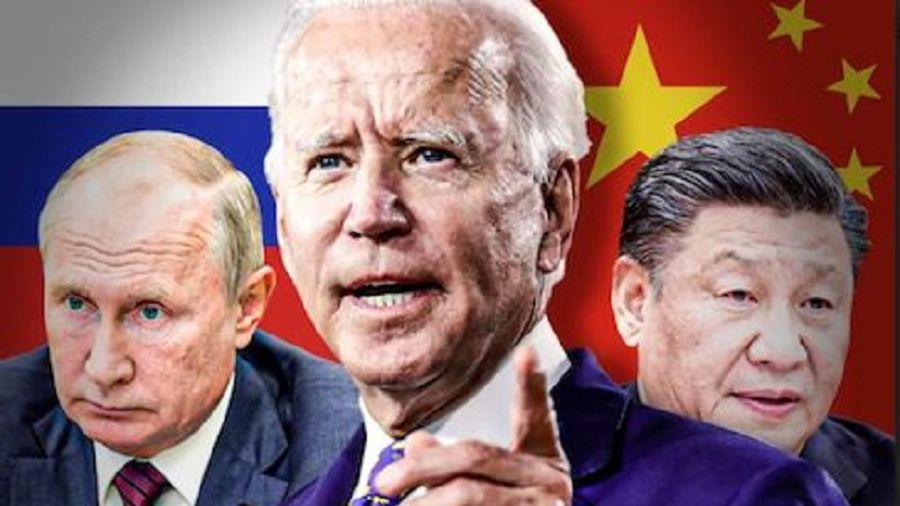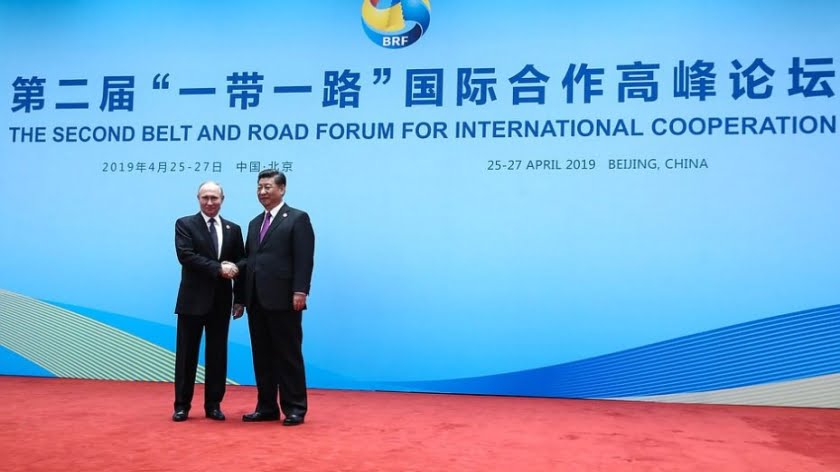What Are the US Deep State’s Grand Strategic Calculations Vis-à-Vis Russia & China?
It would of course be best for the US not to seek the ‘containment’ of Russia or China, but since that course of action seems unrealistic due to the grand strategic inertia of this fading unipolar hegemon, one or the other will inevitably be prioritized.
The US’ permanent military, intelligence, and diplomatic bureaucracies (“deep state”) are divided into two fiercely competing factions: the comparatively more presently influential anti-Chinese one that stands as among former US President Donald Trump’s most enduring legacies and their subversive anti-Russian rivals that are trying to return to the policymaking fore by hook or by crook. They’re split over which of these two Eurasian Great Powers constitutes the greater long-term strategic threat to the US.
Up until the prevailing Trump-backed faction came to power and was surprisingly inherited by incumbent US President Joe Biden, the hitherto indisputably ruling anti-Russian one did its utmost to neutralize Russia’s nuclear second-strike capabilities through the deployment of so-called “anti-missile systems” and strike weapons (including under the cover of the aforementioned systems) towards Russia’s borders.
It wasn’t until the former US leader succeeded in redirecting his country’s grand strategy against China that America began to countenance cutting a pragmatic series of compromises with Russia to de-escalate tensions in Europe. That could then enable the Pentagon and its NATO allies to redeploy some of their forces from there to the Indo-Pacific in order to more aggressively “contain” China. This was Biden’s intent in meeting with Russian President Vladimir Putin last summer, for example.
Regrettably, the subversive anti-Russian “deep state” faction leveraged their extensive network of influence in the Baltics, Poland, Ukraine, UK, and within the US’ own academia, media, and policymaking circles to sabotage this. Through the regional tensions that they provoked, they established the pretext for potentially deploying strike weapons – including hypersonic ones – closer to Russia’s borders under the cover of “anti-missile systems” in response to another round of civil war in Ukraine.
This prompted Russia to publicly declare its red lines and immediately request security guarantees from the US, which in turn led to the recent round of negotiations between them that haven’t yet resulted in any tangible agreement. The very fact that they took place and are planned to continue, though, speaks to the Biden Administration’s sincere intent to seriously explore this possibility in order to continue with the anti-Chinese grand strategy pioneered by its predecessor.
That, however, can only happen if the subversive anti-Russian “deep state” faction doesn’t sabotage this process by successfully provoking another round of civil war in Ukraine that could then serve as the pretext for deploying the suspected strike weapons closer towards Russia’s borders. There are also reportedly plans in place for the US to deploy between 1,000-5,000 troops to the region in the event that tensions escalate, with the possibility of even multiplying that number by a factor of ten.
Should that scenario fail to be averted through either the prevailing anti-Chinese faction of the US “deep state” clinching a deal with Russia and/or this group removing Ukrainian President Volodomyr Zelensky (whether directly or by passively facilitating this even by at least just standing aside as it unfolds), then their grand strategic plans to prioritize “containing” China in the New Cold War will collapse. There’s no way they’d ever be able to return to that policy in the aftermath of that scenario.
In that case, the “deep state’s” grand strategic calculations would have changed since the anti-Russian faction would have flipped the dynamics around on their prevailing anti-Chinese peers in order to become the permanent bureaucracy’s most powerful force. That would see them imposing a policy of maximum pressure on Moscow in spite of the expected consequences entailing considerable collateral damage for their European allies’ economies.
The US’, though, would be largely insulated from that since it isn’t closely connected to the Russian economy like theirs is. Moreover, American businesses could even potentially swoop in to buy off European companies on the cheap in the event that this artificially manufactured economic crisis leads to them becoming desperate enough to seek outside assistance. That could in turn eventually enable the US to restore more of its economic influence over the continent.
The long-term goal that the anti-Russian “deep state” faction would be aiming to achieve is to successfully place their targeted Great Power in a position of nuclear blackmail. This would be accomplished by winning the ongoing arms race taking place in Europe related to the mass deployment of various US strike weapons – including hypersonic ones – and accompanying defensive ones like “anti-missile systems” as close to Russia’s borders as possible.
The end game is to retake control of Russia’s economy after coercing it into carrying out never-ending unilateral concessions in this respect so as to ultimately deprive China of those resources. This is of course a political fantasy in the present and there aren’t any credible reasons to expect it to achieve any progress, not even in the far future, but it nevertheless attempts to explain the anti-Russian “deep state’s” calculations in as seemingly “rational” of a manner as possible.
If Russia can eventually be turned back into a US-led Western client state, then it could be ordered to join that bloc’s global “containment” measures against China. That could see it “choking off” the People’s Republic, which in the US “deep state’s” expectations could then repeat the same process against this Great Power as they would have by then succeeded in doing to the other. The end goal, just like before, is to place their target in a position of nuclear but also economic blackmail.
Conjecturing about the anti-Russian faction’s calculations, they might try to sell their grand strategic shift to their anti-Chinese peers by pointing out how the economic consequences of their maximum pressure campaign against Moscow entail far lesser blowback for them than doing the same against Beijing. That’s because the American economy hasn’t “decoupled” from China’s whereas it has no similar such complex mutual interdependence with the Russian one.
With this in mind, they might try to make their policy pivot come off as a more pragmatic one in terms of the bigger picture even though it’s unrealistic to expect China to initiate its own “decoupling” from the US in the event that tensions between those two continue deteriorating if the anti-Chinese “deep state” faction’s grand strategy continues to unfold. Having said that, the greatest drawback of the anti-Russian faction’s plans is that the military consequences of an uncontrollable conflict are apocalyptic.
That wouldn’t necessarily so much be the case if things went wrong with China, though that’s also not to say that there wouldn’t be any unacceptably high costs to such a conflict either. It’s just important to remind everyone that Russia is a nuclear superpower whereas China has yet to become one and doesn’t seem interested in even aspiring for that status, seemingly content with solely retaining a credible nuclear second-strike capability.
Regardless of which “deep state” faction comes out on top in this intra-bureaucratic competition, which will be determined by the outcome of the undeclared US-provoked missile crisis in Europe, the end result will still be extremely destabilizing for the world. It would of course be best for the US not to seek the “containment” of Russia or China, but since that course of action seems unrealistic due to the grand strategic inertia of this fading unipolar hegemon, one or the other will inevitably be prioritized.
From a so-called “pragmatic” perspective, arguments in that case can be made for and against prioritizing either of them. As was explained, targeting Russia entails less economic consequences for the US (and potentially enormous economic benefits vis-à-vis gobbling up desperate European companies) but could literally end the world if there’s a war by miscalculation. This angle of analysis, however, might naturally find disfavor among most Europeans except for the most anti-Russian ones.
As for targeting China, this could be economically disastrous for the entire world, though with the People’s Republic likely proving to be much more resilient than the Western economies due to its socio-economic and governing system. Any kinetic conflict by miscalculation might not end the world, but it could utterly destroy Northeast, East, and Southeast Asia, at the very least. This could wipe out a huge chunk of humanity in the worst-case scenario. Americans and Europeans might not care, though.
The observations made in the last two paragraphs are admittedly insensitive but that was deliberate in order to sober everyone up into realizing the enormity of what’s at stake in both scenarios. Neither of them is advantageous since they’re both zero-sum in their own way and entail immense collateral costs. Nevertheless, since it seems inevitable that clarity will soon emerge about which of them will be prioritized upon the outcome of the undeclared US-provoked missile crisis in Europe.







